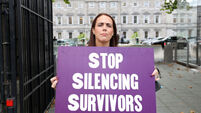Colm O'Connor: School is where our children can learn to respect themselves and each other

A joyous occasion in itself, as pupils cheer on their school's team in this photo from the 1940s. But the troubling thing about the image is that it could easily be replicated today: Ireland is an outlier in continuing to segregate the sexes right through primary and secondary school cycles. Picture: Irish Examiner Archive
The need for us all to speak up against all forms of gender discrimination is clearer than ever, and I would like to contribute to the discussion from the sector that I know best, the education system.
















